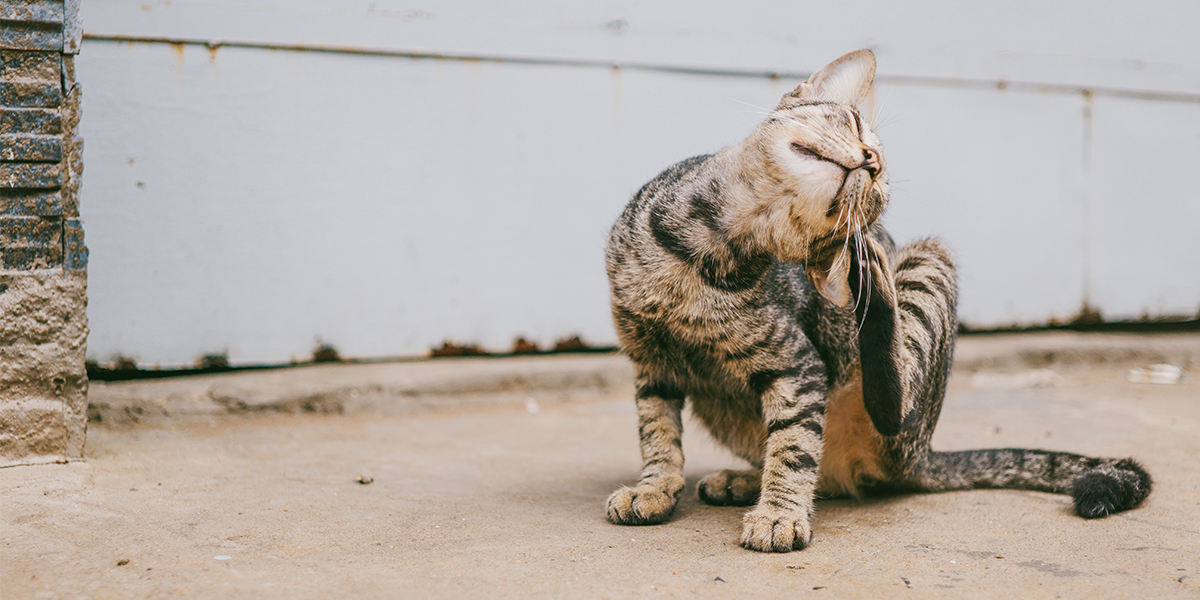Excessive meowing and other noises. Its symptoms is a collection of painful pus at the site of wound or bite.

Cat Keeps Shaking Head But Has No Mites
Medical causes of twitching in cats Hypocalcemia Low blood calcium levels can occur as a result of lactation vitamin D deficiency pancreatitis phosphate enemas chronic kidney disease and hypoparathyroidism.

Cats head twitching and itching. I am so sorry about your beloved pet. Ear mites and other mites. Cat symptoms of dermatitis include red and itchy bumps.
Abscess Dermatology Problems In Cats. Cats are also prone to allergies and may be allergic to certain a food plants pollen grass or fleas. Some cats growl or attack their own body.
Atopy house dust and pollen allergy Insect bites. Notice if there is any fluid. Check the inside of the cats ears by putting the cat in your lap and flipping over its ear flap.
What can cause cats to itch other than fleas. Below is a list of the 6 most common ear diseases that may cause itching and head shaking in cats. Cat head twitching by.
Intense swishing of the tail. Unless the mange is managed the itching will continue. Sneezing loud breathing and itching around eyes or ears are common signs.
Foul odor from the ear canal. In extreme cases cats with hyperesthesia may. Others lick their paws uncontrollably when scratched.
Some cats may have more than one manifestation of disease present simultaneously eg indolent ulcer and symmetrical hair loss. Look at the cats ears for redness or irritation. Look for any redness or irritation around the outer ear area.
She is on Phenobarb now. If your cat suddenly develops a head tremor a shake they cannot control contact your vet for an emergency appointment. Top Causes of Itching 1.
Localized trembling or twitching in cats most commonly affects the head or hind legs. The scabs will invariably. In both localized and generalized trembling the movement may be persistent or episodic.
My 7 yr old statred with head twitching on Saturday and by Monday was already seen by a Neurologist had blood work X rays and an MRI. You should suspect ear mite infestation if you see the following signs and symptoms in addition to your cat shaking head. Ear mites are another skin problem in cats that also cause itches.
Rippling or twitching of skin on the lower back both after touch and for no apparent reason Dilated pupils. The skin can get irritated when the cat has fleas or mites. The cat will continuously scratch and it may use the muscles under its back to move the skin in a twitching motion in an effort to be more comfortable.
Brown waxy material in the ear. Excessive licking can actually damage the skin leaving open wounds prone to infection. Parasites that live on the skin are called ectoparasites a term that includes fleas ticks mites and other organisms.
Some experts believe twitch-skin syndrome is a neurological disorder as touch stimulation along the spine which houses the spinal cord. The mites cause the affected cat intense itching which manifests in the cat shaking head and discomfort. Shifting and tilting of the head.
Mites can then spread around the head and body leading to mange. Some cats show other symptoms during their episodes including. Cats may do this in response to the itching twitching feelings they experience under the skin.
Why are my cats ears itchy. The skin can get irritated when the cat has fleas or mites. The muscle trembling could also be general meaning it affects the entire body.
Felines exposed to an allergy trigger can also develop severe. They may act painful when petted or you may see their skin twitch or roll as if they have an itch. These allergies can cause itching in the neck and head area resulting in a head shaking like Parkinsons.
Pesky little passengers such as fleas and mites are a common cause of itching in all pets including cats. Twitch-skin syndrome in cats still has veterinary experts puzzled as to what causes this bizarre feline behavior. The terms refer to cats that are chronically hypersensitive to stimuli at their lower back and tail base.
Another key symptom is the sudden occurrence of intense scratching biting andor licking of the back tail and rear legs. A cat with feline hyperesthesia syndrome may have any of the following signs. More commonly parasitic infections sometimes referred to as parasitic infestations can cause cats to become itchy.
A head shake is when your cat shakes their head on purpose a head tremor is when they develop a shake that they cant control. Some cats suffer from allergic reactions when exposed to particular irritants in the environment or their food. A cat shaking or tilting its head can be a symptom of an ear infection or a toxin in its ears.
Itching can also lead to lots of licking or scratching at the area which will cause inflammation of the skin. So far everything is negative and the Neurologist thinks late onset seizures. This will itch profusely and quickly scab over.
Several types of ear mites live in the ears of cats but the most common is Otodectes cynotis. If this happens try to isolate your cat from such allergens or. Kittens are especially more prone to infestation with these parasites.
Important causes of pruritus other than fleas include. Biting or licking the lower back sides hind paws rear or tail. Its important to know the difference between a head shake and a head tremor.
Mange will cause patches of dry skin all over the cats body. Another common reason for twitching in a cat is itchy and irritated skin.